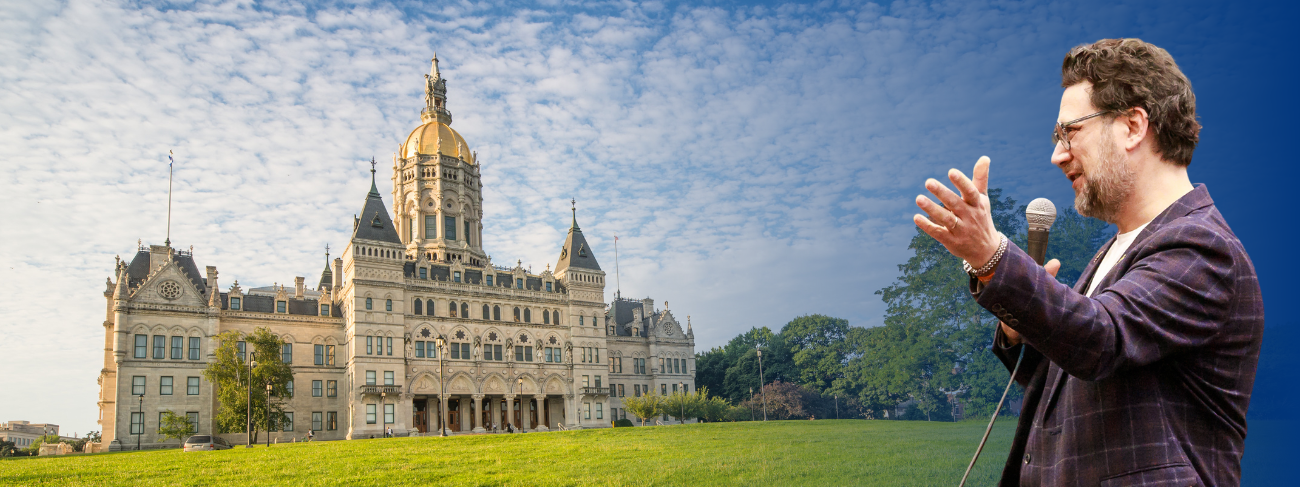Bringing Manufacturing Home Town Hall

It's quite an honor to be with this distinguished panel as well as with my good colleagues Representative Porter, Hughes, Winkler, Simms, and Hennessy, talking about how we can move forward in a new industry while we ensure a maximizing of the creation of jobs for our local communities while using the best environmental standards to protect this incredible marine environment which protects us against climate change. The first and worst impacted, are from the vulnerable communities, that could also be those benefitting from those jobs.
Please click here to see the the video.
As a freshman legislator in 2019, I was approached by the carpenters to talk about offshore wind, Chris that you heard earlier, the president of the CT Carpenters Union, and Katharina Hallden, an environmental lawyer from Sweden, that works with a tech company and that you will hear from later.
I was asked if I had concerns or was supporting offshore wind, and I mentioned my concerns with the noise. I had seen Sonic Sea a few years back, which alerted me to sound pressure being considered pollution. Simply put, our noise effects the marine wildlife more than most know.
The carpenter's explained that the technique for the footing was going to be most likely involving pile driving steel pipes into the sea floor. I was immediately alarmed.
2019 was a year with bill for our second procurement for offshore wind farming and I decided to offer amendments to my colleagues to impose a limit of noise and to require more focus on job creation.
When younger, I sold steel for some of the best and biggest forges in Europe. The steel that we're talking about in this case will never be made here and we were looking at the potential destruction of the most crucial part of our life support system while creating jobs abroad instead of at home.
In my background in activism which involved social justice as well as biodiversity protection, I had learned that whales are keystone species and that threatening their existence was also threatening our own.
It is also clear that the ocean, yes I said the ocean, not the oceans, if you look at the world map it's one body of water, is the climate regulator and it's amazing biodiversity are very much the operators of our life support system.
Threatening our life support system is not an option. So I asked the carpenters what would be another viable technique for the footing of the offshore wind turbines. This is when I learned about concrete gravity base, a silent technique, that would create between 10 to 30 times the amount of jobs, that would protect in the best manner our precious marine environment.
Later that session, I offered amendments which were guaranteed not to work as I was working against a very large majority of legislators that were simply uninformed on the matter, and this is not a reproach as we have very limited time for our sessions most legislators stay focused on their key areas of cognizance. We had done some good work at educating many legislators but it was still not enough and we had to often debunk some of the ill-angled information being shared.
I was offered another approach and decided to engage in pushing for the creation of the commission for environmental standards. The commission made recommendations to our Department of Energy and Environmental Protection and Connecticut is often referred to as the state with currently the best environmental standards. And those standards are by far not sufficient.
We often hear about the Green New Deal, and I believe we have such an opportunity here today in Connecticut, in New England, to work together with environmentalists, with labor, for a joint goal of sustainability and survival. It is a very rare opportunity but one that all elected officials at any and all levels of government should prioritize as it is the way to move forward into a better future where corporations and private interests no longer rule.
The stricter environmental standards are the better it is for everyone in terms of public safety, resilience, real equity, and sustainability. The more jobs we create, the stronger our economy will be, the better will be our financial resilience, sustainability, and economic justice.
|
|





